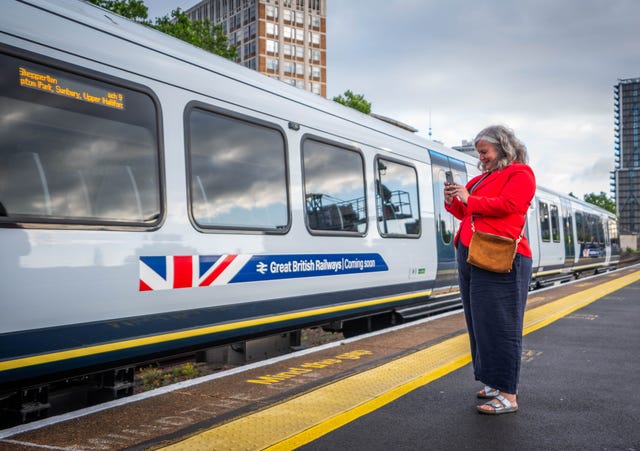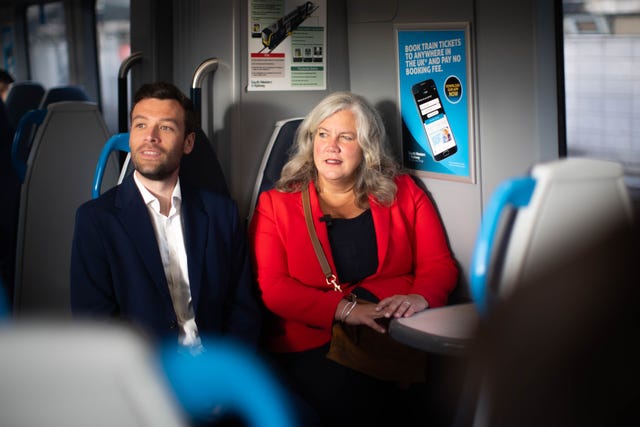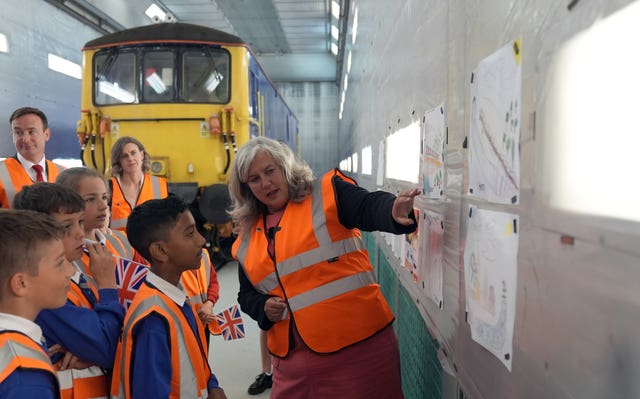Renationalisation of Britain’s train services begins
All services run by private companies will be renationalised as contracts reach the end of their minimum terms.

The Government’s renationalisation of rail services has started as trains operated by South Western Railway (SWR) were taken into public control.
Transport Secretary Heidi Alexander, who travelled on the first renationalised departure from London Waterloo, said it was “a new dawn for our railways”.
SWR was previously owned by FirstGroup and MTR Corporation, but is now the responsibility of DfT (Department for Transport) Operator.
All other services run by private companies will be renationalised as contracts reach the end of their minimum terms.

The next operator’s services to be brought under public control will be c2c – which runs between London and Essex – on July 20, with Greater Anglia following in October.
The process is scheduled to be completed by the end of 2027.
Britain’s railway services were privatised in the mid-1990s.
Speaking before boarding the 6.14am service to Shepperton, Surrey, Ms Alexander said: “Today marks a new dawn for our railways.

“Moving away from 30 years of inefficiency, delayed services and failing passengers, and moving confidently into a new era – the era of Great British Railways.
“That’s why I was so adamant I had to be here at Waterloo this morning, alongside all these other excited passengers and rail aficionados, for what really is a watershed moment.
“Most rail users don’t spend much time thinking about who runs the trains, but they do want them to work, and that’s why there’s a genuine excitement here today at the generational opportunity we have to completely transform train travel in this country.
“As the 6:14 service leaves Waterloo, I’ll be sat on it with a sense of pride but also a determination to get this right and deliver a railway Britain can be proud of again.”
In a post on X after the train departed, Ms Alexander said: “Up early to be on the first train out of Waterloo under public ownership. A big day!
“Later this year we’ll bring forward legislation to set up Great British Railways, integrating the management of track & train.
“One team, one railway, delivering higher passenger standards.”
Office of Rail and Road (ORR) figures show the equivalent of 4% of services in Britain were cancelled in the year to April 26.
For SWR, the figure was 3%.
Renationalised services will be integrated into Great British Railways (GBR), a new public sector body which will also oversee rail infrastructure.
Legislation to enable the creation of GBR is expected to be introduced in Parliament later this year.
Shadow GBR has been established to ensure closer collaboration within the industry.
Richard Bowker, former boss of the Strategic Rail Authority, which was a public body providing direction for the industry between 2001 and 2005, said it is “quite easy to be sceptical” about the overhaul but he believes there is “real potential here for things to get better”.
Mr Bowker, who presents rail podcast Green Signals, went on: “It has become overly complex, and I think bringing together track and train more now is a pragmatic and sensible thing to do.
“The key with this will not really be who owns it. Are the people that are going to be running it day to day… going to be genuinely empowered to make the right decisions to run the railway?
“We’ve got plenty of very, very able managers, but over the last five years – particularly since Covid when franchises effectively went bust and national rail contracts were put in place – there has been a huge amount of centralised control, and it’s quite stifling.”
Johnbosco Nwogbo, of public ownership campaign group We Own It, said: “Today is a great day for passengers because our railway is finally beginning its journey back to putting us, our communities and our planet before the profits of private shareholders.
“But the job is not yet done. The Government still has to get public ownership right, so that it really delivers for people.”
PA news agency analysis found the renationalisation of SWR means a third of journeys are on publicly owned services.
That is based on passenger journey data for 2024 from the ORR.

Operators that were already under public ownership are LNER, Northern, Southeastern and TransPennine Express.
GBR branding has been added to one SWR train.
It features part of a Union flag, the double arrow symbol that is synonymous with Britain’s railways, and the words “Great British Railways coming soon”.
More trains will be given the branding over the coming months and years.
But the DfT said publicly owned services “will need to meet tough performance standards to be rebranded Great British Railways”.
These standards will cover factors such as punctuality, reliability and the experience of passengers.
The DfT said its renationalisation policy will save taxpayers up to £150 million per year in fees previously paid to private companies that ran services.
The first SWR service under public ownership was a rail replacement bus.
After the implementation of renationalisation at 2am, passengers travelling on the 5.36am service from Woking to London Waterloo had to change to a bus at Surbiton because of engineering work.





